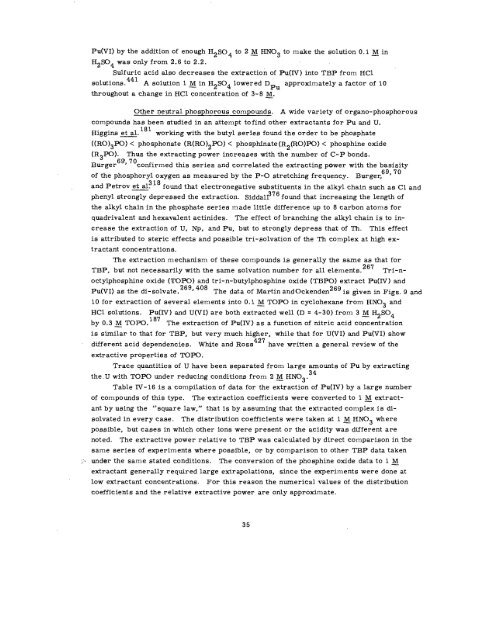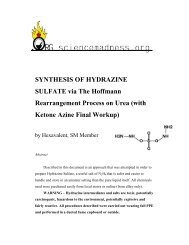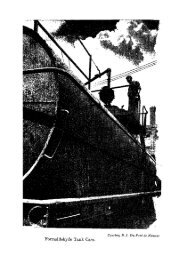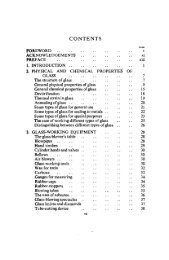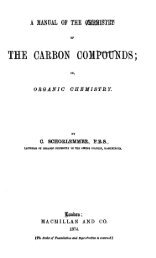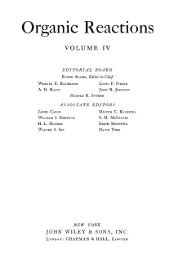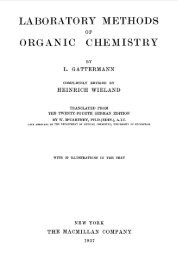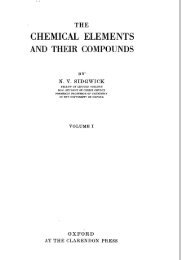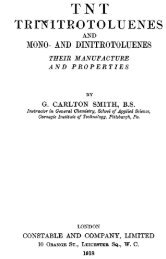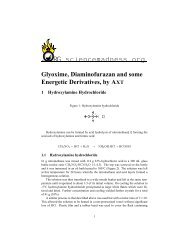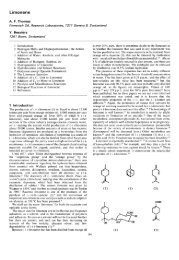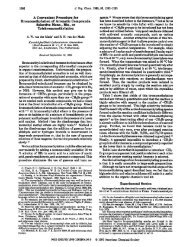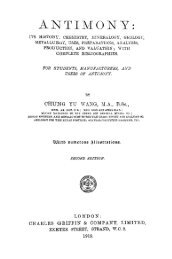THE RADIOCHEMISTRY OF PLUTONIUM - Sciencemadness.org
THE RADIOCHEMISTRY OF PLUTONIUM - Sciencemadness.org
THE RADIOCHEMISTRY OF PLUTONIUM - Sciencemadness.org
Create successful ePaper yourself
Turn your PDF publications into a flip-book with our unique Google optimized e-Paper software.
Pu(VI) by the addition of enough H2 SO ~ to 2<br />
—<br />
M HN03 to make the solution O. 1 M in<br />
—<br />
H2S04 was only from 2.6 to 2.2.<br />
Sulfuric acid also decreases the extraction of Pu(lY) into TBP from HC1<br />
solutions.441 A solution 1 ~ in H2S04 lowered Dpu approximately a factor of 10<br />
throughout a change in HC1 concentration of 3-8 M.<br />
—<br />
Other neutral phosphorous compounds. A wide variety of <strong>org</strong>ano-phosphorous<br />
compounds has been studied in an attempt to find other extractants for Pu and U,<br />
Higgins et al. 181 working with the butyl series found the order to be phosphate<br />
(( RO)3PO) < phosphonate (R(RO)2PO) < phosphinate (R2(RO)PO) < phosphine oxide<br />
(R3PO). ThUS the extracting power increases with the number of C-P bonds.<br />
Burger<br />
69, 70<br />
corrfirmed this series and correlated the extracting power with the basisity<br />
of the phosphoryl oxygen as measured by the P-O stretching frequency. Burger,<br />
69, 70<br />
and Petrov et al? 18<br />
found that electronegative substituents in the alkyl chain such as Cl and<br />
phenyl strongly depressed the extraction. Siddal~76 found that increasing the length of<br />
the alkyl chain in the phosphate series made little difference up to 8 carbon atoms for<br />
quadrivalent and hexavalent actinides. The effect of branching the alkyl chain is to in-<br />
crease the extraction of U, Np, and Pu, but to strongly depress that of Th. This effect<br />
is attributed to steric effects and possible tri- solvation of the Th complex at high ex-<br />
tractant concentrations.<br />
The etiraction mechanism of these compounds is generally the same as that for<br />
TBP, but not necessarily with the same solvation number for all elements.<br />
267<br />
Tri-n-<br />
oct ylphosphine oxide (!TOPO) and tri-n-butylphosphine oxide (TBPO) extract Pu(IV ) and<br />
Pu(VI) as the di - solvate.<br />
269, 408<br />
The data of Martin and Ockenden 269. 1s ~ven in Figs. 9 and<br />
10 for extraction of several elements into O. 1 ~ TOPO in cyclohexane from HN03 and<br />
HC1 solutions. Pu(IV) and U(VI) are both extracted well (D = 4-30) from 3 ~ H2S04<br />
by 0.3 ~ TOP0.187 The extraction of Pu(lV ) as a function of nitric acid concentration<br />
is similar to that for TBP, but very much higher, while that for U(VI) and Pu(VI) show<br />
different acid dependencies. White and ROSS427 have written a general review of the<br />
extractive properties of TOPO.<br />
Trace quantities of U have been separated from large amounts of Pu by extracting<br />
the U with TOPO under reducing conditions from 2 ~ HN03. 34<br />
Table IV- 16 is a compilation of data for the extraction of Pu(IV) by a large number<br />
of compounds of this type. The extraction coefficients were converted to 1 M extract-<br />
—<br />
ant by using the “square law, ” that is by assuming that the extracted complex is di-<br />
solvated in every case. The distribution coefficients were taken at 1 ~ HN03 where<br />
possible, but cases in which other ions were present or the acidity was different are<br />
noted. The extractive power relative to TBP was calculated by direct comparison in the<br />
same series of experiments where possible, or by comparison to other TBP data taken<br />
,.i under the same stated conditions. The conversion of the phosphine oxide data to 1 ~<br />
extractant generally required large extrapolations, since the experiments were done at<br />
low extractant concentrations. For this reason the numerical values of the distribution<br />
coefficients and the relative extractive power are only approximate.<br />
35


